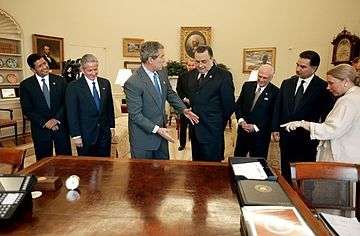Aguas Santas Ocaña Navarro
| Aguas Ocaña | |
|---|---|
| First Lady of Honduras | |
|
In role October 8, 2002 – January 27, 2006 | |
| Preceded by | María Flores |
| Succeeded by | Xiomara Castro |
| Personal details | |
| Born |
Aguas Santas Ocaña Navarro April 23, 1963 Brenes, Seville, Spain |
| Spouse(s) | [1] |
Aguas Santas Ocaña Navarro (born April 23, 1963) was the first lady of Honduras. Aguas Santas, her double given name, means "holy waters" in Spanish.
Marriage and first lady
Ocaña Navarro was the wife of former President Ricardo Maduro, marrying him when he was already President in October 2002 after meeting him during a 2-year stint working in the Spanish embassy in Tegucigalpa. She received dual Spanish-Honduran citizenship in 2004. Her marriage to Maduro ended in divorce in 2006 as Maduro's term in office came to a close.[1]

Working with and adoption of children
In January 2003, Aguas Santas visited El Hogar de Niños Emanuel in San Pedro Sula, along with several executives of Spanish corporations operating factories in that city. They were hoping to raise awareness for the orphans remaining in many orphanages as a result of Hurricane Mitch, which had devastated Honduras in 1998.
She legally adopted two children, but she now has 13 children in her care, all of whom accompanied her to Nicaragua on January 27, 2006, the day she ceased being first lady. She worked there with Nicaraguan children in need, and helped the wife of Nicaragua's then President, Enrique Bolaños. The five children legally adopted are called Leidy Jackeline, Kevin Josué, Francis, Joan and Jackie.
As first lady of Honduras she was particularly known for her work with Street children and visiting jailmates. She created a program, "Cero Niños en las Calles", which is geared towards eliminating children working in Honduras' streets. This program has been severely criticized by her husband's political opponents. Ocaña Navarro continues fighting for children's rights, by denouncing a U.S.-based organisation that was allegedly involved in the selling of adoptive children by using the internet to lure prospective clients.
References
- 1 2 "Aguas Ocaña atribuye su divorcio a vida pasada de Ricardo Maduro" (in Spanish). Hoy. February 1, 2006. Retrieved 2016-11-20.